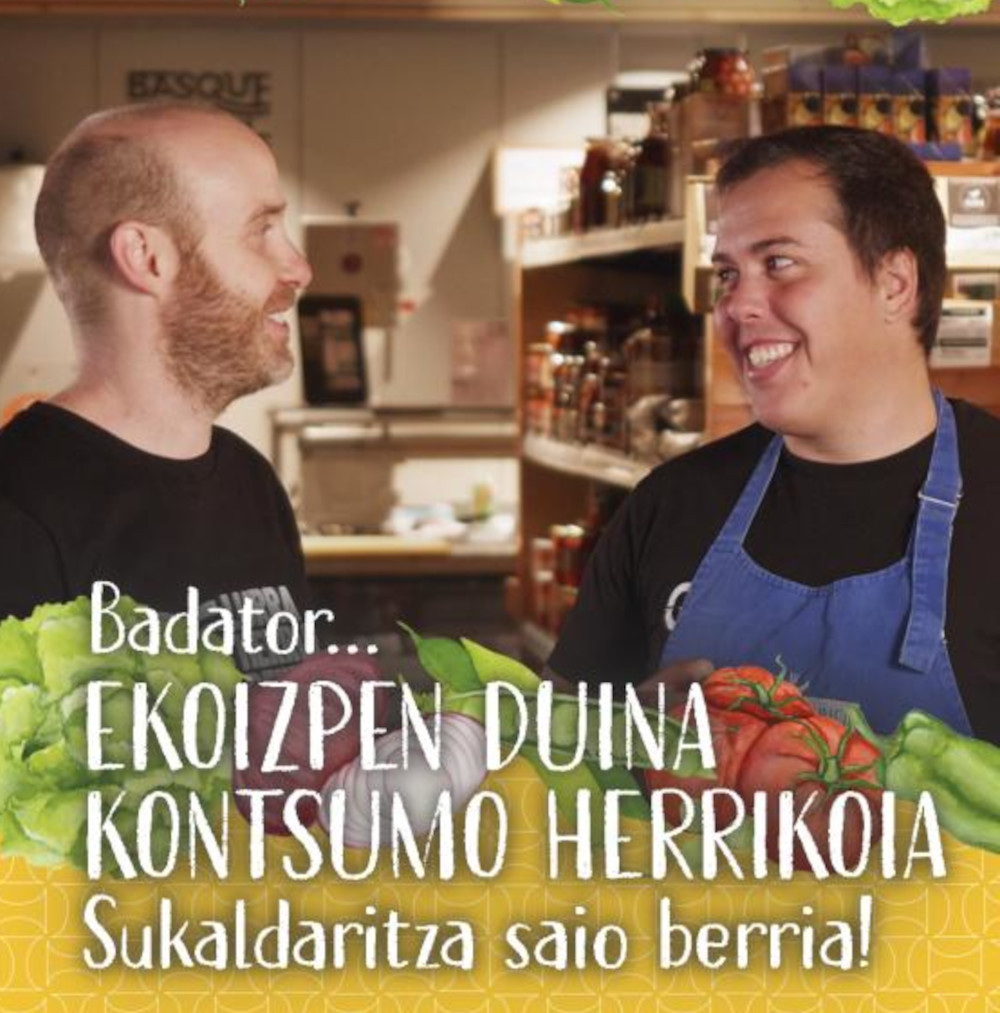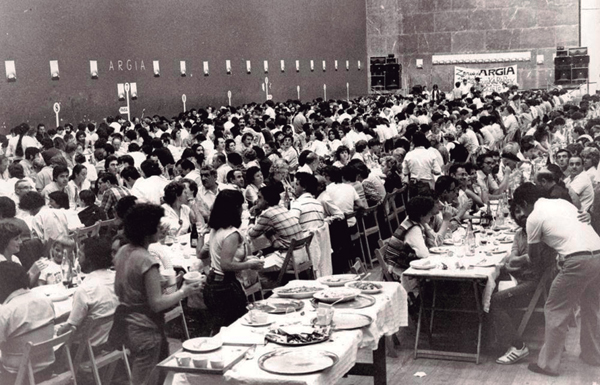"We'll see how kitchens are going to disappear from houses over two generations."
- The cook Iñaki Andradas wants to turn to his kitchen, and it is seen that his proposals do not leave anyone indifferent. In these sanfermines will offer us the feast to eat in the new store that has been set up by DIBUJANTE Mikel Urmeneta.
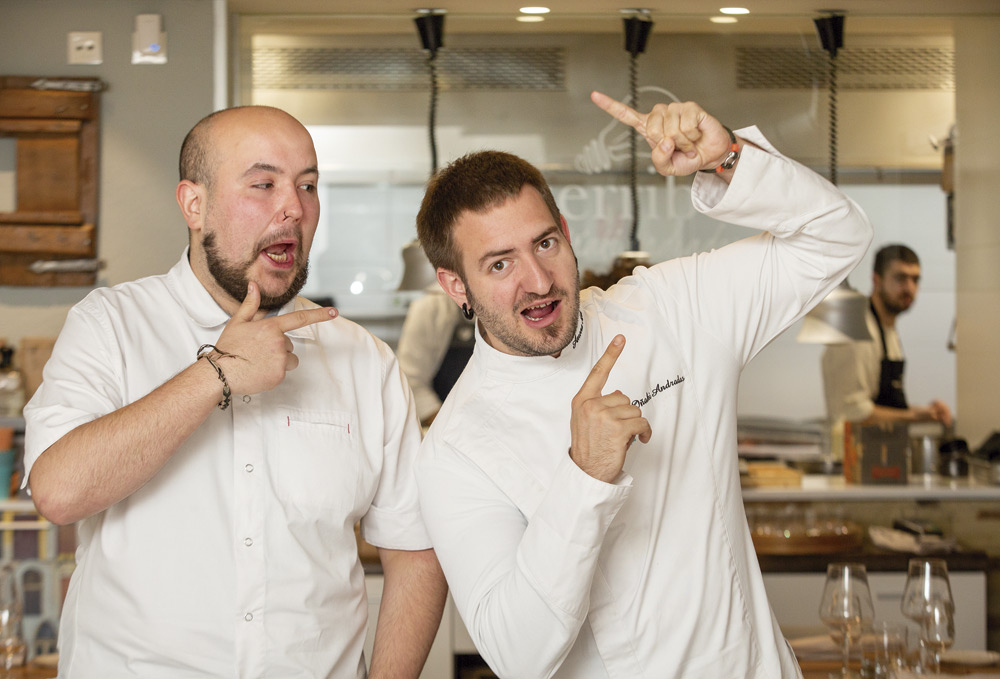
Euskal Herriko sukaldari onenekin ikasi ondoren, gastronomiaren gorenean kokatu da urte gutxian. 2014an nafar sukaldari errebelazioa izan zen; 2016an Baserri jatetxe zaharra hartu eta Baserriberri abangoardiako jatetxe bihurtu zuen Luken Vigorekin batera; 2017an Iruñeko pintxoen lehiaketa irabazi zuten “Bombeja” ikusgarriarekin, eta aurten ere lehen saria lortu dute “Resakwich revolotum re-CenoZ” bestondoaren aurkako mokaduarekin.
22 razones para tener vino en tu mesa liburuaren egilea, Iruñeko Indara dantzaleku eta musika aretoko aholkulari gastronomikoa eta duela gutxi ateak zabaldu dituen Sanferfood denda eta proiektuaren sortzailea da Mikel Urmenetarekin batera.
How would you define yourself?
I am a gourmet, I usually say in Spanish that I am gastronomic. I want to create what I like, and that's where the strength comes from. Although I am now a cook, I do not rule out the possibility of opening up other creative avenues in the future. Now my passion for cooking is total. I don't know why, but there is something that brings me terrible joy and that pushes me every day, when I wake up, to undertake with illusion. On the other hand, I also like to make the discussion take place. What I do to people or they like a lot or not. I'd rather be like that, without realizing, like, another restaurant, than going past. Love or hate, I love the two extremes, and I too, in a way, am like that.
How did you start in the kitchen?
When I was a kid, I loved cooking with my grandmother Sara. That's why I always have her name embroidered on the neck of the uniform. In my family, I've always been taught the principle of eating right and having parents who have never taken you to McDonald's is a tremendous fortune. Quality has always prevailed, and that has borne fruit.
You've had the opportunity to train yourself with the best.
Yes. I studied at the Luis Irizar school in Donostia and then I was Zuberoa, Arzak, Urepel, A negro, in Europe… In Euskal Herria I worked with many great cooks and it has been wonderful. Very intense but terrible years.
How did Baserriberri emerge?
Three years ago, we formed a group -- the chef Luken Vigo, the manager and partner Oihane Larrañaga and the three -- and we started the project of opening a new bar-restaurant. In addition, we started working with Cocuus (Creative Kitchen Engineering System) from the very beginning, and thanks to them we managed to use the most innovative technology to strengthen our creative kitchen. We have set up a very good team and we are happy.
"Being parents who have never taken you to McDonald's is a tremendous fortune."
What is innovative technology?
The special tool we have in our kitchen lab allows us to make 3D prints, such as engravings or high-precision cuts, and the results are spectacular. We're working on food industry research at our research center in Zizur and we're in touch with big international companies, because that's the future.
What do you propose in the new Sanferfood store on Estafeta Street in Pamplona is also out there?
Yes, it is true. We've brought together Mikel Urmeneta's imagination and my creativity to make edible gifts, and we're doing it with passion. We do not yet know exactly what kind of offer we are going to make and, in fact, opening a store like this, not knowing very well what to sell, is a brave frikada.
We will have cookies with faces of giants, retractable pochas from Navarra, buckets of stewed bull, “Fuck” and beef sausages. We've called this sausage Bull-dog and it's made of ecological bull. We want a product that anybody can enjoy. One of the things I've learned with Mikel is that Pamplona is very close here, very closed. It's got the txapela very meted out and many times it doesn't let us see any further. If an idea is good in Toronto, Tokyo and Bogota, it will be a good idea in the world and will succeed everywhere. Instead, if you make an edible red cloth, you won't succeed in the world, because the referents are different.
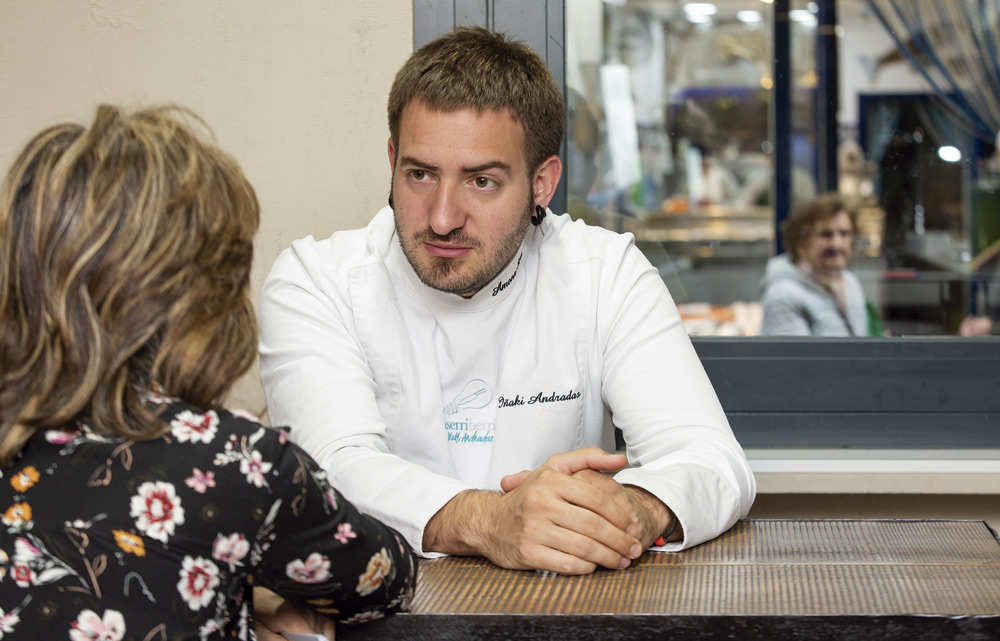
How have you joined these two figures?
Two years ago, I met Mikel Urmeneta on a chuletones tasting. It's been a kind of love. He's more an artist than I am, and I'm sure I don't want to be like him, but he's a genius and he's helped me a lot.
On the other hand, what is happening with him and with the pelotari Mikel Goñi is an incredible thing. They're true myths, and people tell a thousand stories about them, some of them real and many others invented. Surely there would be a movie in Hollywood!
Should we be more generous in the face of new flavors?
No doubt. You need to innovate in the food industry and create millennial flavors. Globalisation, among other things, has made the 20-year-olds already know three countries. My grandparents traveled to Zaragoza on the wedding trip. At the time of my parents the opportunities were Benidorm or Italy and now the young people go to Thailand. When I was a kid, they opened the first Chinese restaurant here, and it was wonderful. Today, however, we're all used to eating curry and raw fish, and people want new things. In the Indara room in Pamplona we want to achieve that: combine good music with flavors from all over the world in rations and pintxos.
How do you get so many sites at once?
I sleep very little. I'm not a very serious person. I travel here and there in meetings, participating in culinary initiatives, traveling… I am not standing and I really like to go like this. That is why I value a good team working alongside me. The personal cost of being an entrepreneur is very bad for me. Moving from being a colleague to being the boss is a disgusting thing. However, in Baserriberri we tried to improve the working conditions of the very usual hospitality workers.
I did not intend to enrich myself, but not to fail. I have a lot of proposals, but we have to choose our fellow travellers very well. I've always worked more than 55 hours a week, but here everybody signs and 38 or 40 hours a week ago, and if there's anything above that, you pay an extra hour. It is clear to me that the workers in a nice place where they eat well also have to be well and at ease. This has been very difficult for us, because when you set up a small company, you have very little help and you can hire very little staff to do an amazing job. I started to say that I didn't have a penny, and I'm very proud that I got it in three years. It was thanks to a wonderful working group. Without them, I'm nothing.
"I'm clear that the workers in a nice place where they eat well also have to be well and at ease."
What do others offer?
Pintxos instantly, a new dish every week and eight weeks a new full menu. Nobody knows what to eat and we give it what we want. We tell the customer: “Come three times and if you didn’t like it or have come back.” The other bars are very similar. They all have a letter, a menu and a potato omelet. We are the only bar that has no potato tortilla. I don't want to. I have a few pintxos on the bar, but for my father. It's very heavy and doesn't understand that the bar is empty. I do it to calm down.
The key to your success is the story that accompanies your pintxos?
Yes. The story is essential. While eating flavor savor is fundamental, it's important to tell something, ignite an emotion. Andoni Luis Aduriz, the most genius among the geniuses, says that there is a sixth taste you take from the area: environment, how they put your food, context… and I agree with one hundred percent.
Are we consumers of tireless stories?
Stories and sensations. People want something new, shiny, spectacular, that can be photographed and uploaded to Instagram. It is a growing hypocrisy. Unfortunately, that is the current reality. I've just arrived from Mexico, where it happens three times more, and in the United States four times more. Everyone wants to see themselves in Baserriberri with the pintxo “Bombeja”. This is how pintxos win prizes.
The key is that the customer feels something. Our bar is for fun and laughing, but sometimes people don't really understand what we do. In the week of the croquette that took place in May, we presented our “Pollocrete”. It was wrapped in a bag of paper, as coca is sold, and it had lines of two white powders next to it. What was inside was a chorizo croquette and the powder was just salt. Some didn't understand it and they ate it all. For others it was amazing and funny, or the opposite. A courageous proposal, always. That is the debate we want to create. In addition, it was a criticism of the dependence we have on fried fish in Pamplona. We don't know how to eat anymore! In our bar, we don't want that, and we prepare the pintxos right now. So until we won a prize, flies didn't get in here. That's our stone.
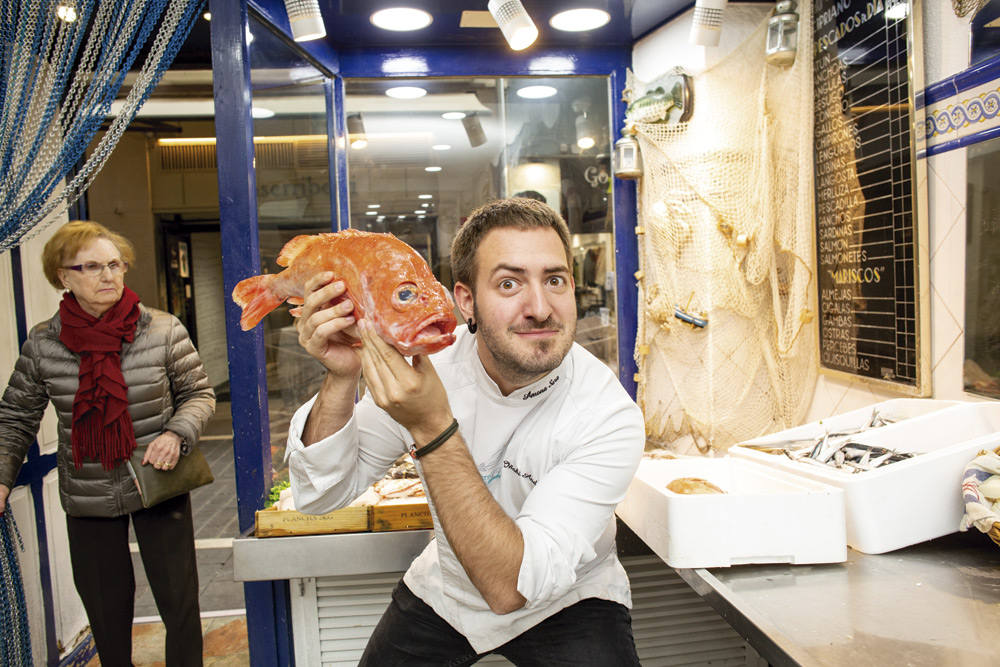
Why are there more men than women in the haute cuisine?
Because women are much faster than we are. This is a miserable life. In the history of Navarra the great cooks have been the women: Atxen, Resu de Rodero, Potxolak, Hartza Ahizpak, Pilar Idoate… These are the ones that have brought our cuisine to the highest, but we are now being foolish in these businesses. Being an innkeeper is very hard. You work when no one wants to work and fame is only shared by five. Here are twelve great cooks and only two of us have a little name.
Are we becoming more and more useless in the kitchen?
Undoubtedly, we are heading towards the products of the fifth range [which use the latest cooking and packaging techniques]. We will see how the kitchens disappear from the houses over two generations: only the microwave and the fridge-freezer. I've walked a lot through Mexico, Peru, the United States, Thailand -- and people don't cook at home. That will be the future. When we want to cook, we're going to go to the food society or the rock, here, but in general that's going to disappear. We'll buy everything; it'll get hot and it's over. There will be competition for price and quality, and you will see who values the organic and quality food and other characteristics.
However, all things have good and bad consequences and I think it will serve to further value our professional work. In Navarra there are only two restaurants that charge 100 euros for eating and how bad we are doing it. The enormous work behind it is not properly taken into account. There are restaurants with a star or about to get it that should charge more, but they don't because their customers don't want to pay.
Today's young people don't cook anymore, and many who start studying cooking do because they think they're going to be famous for the second day, and this isn't the case. If a young man's only goal is to be famous, it's a big mess. I've been called three times to go to the Top Chef, but I don't want to. If I was called Arguiñano, I would leave right away because I'm sure we'd do some laughter, but I didn't think about other kinds of programs.
What exactly is “Resakwich revolotum re-CenoZ”?
A Ajera sandwich. I really like Clamato, for example, who drinks in Mexico to take off my dress, and we get inspired by that. Ours is a bull's tail with kalimotxo and bechamel mussel, all smoothied.
“Kudeaketa lana dudanez, gero eta denbora gutxiago dut sukaldean lasai ibiltzeko. Batzuetan gauez etortzen naiz eta hemen egoten naiz bakarrik, janaria prestatzen, zerbait edaten eta musika entzuten nire harrikadekin. Liluragarria da niretzat”.
The garlic season is already here. Planting season of garlic. His harvest will be later, and he has to start working in the head. In the head, the garlic. But we don't all look for the garlic head. The garlic sown for greens is increasingly seen in orchards. Also in the orchards... [+]

















